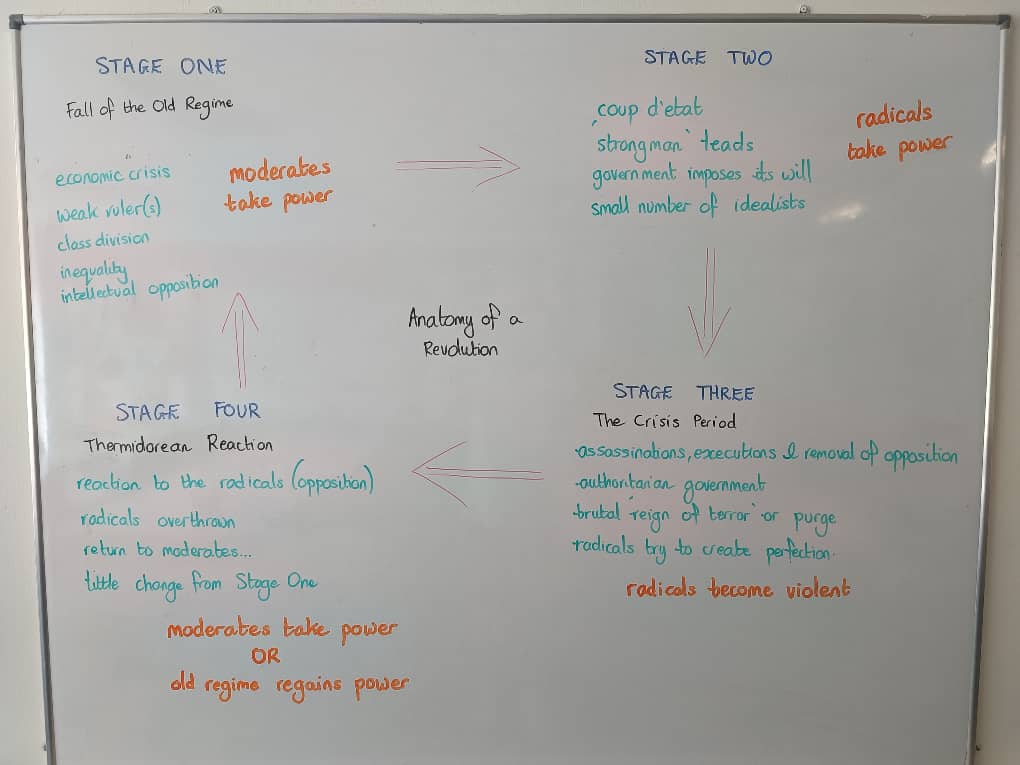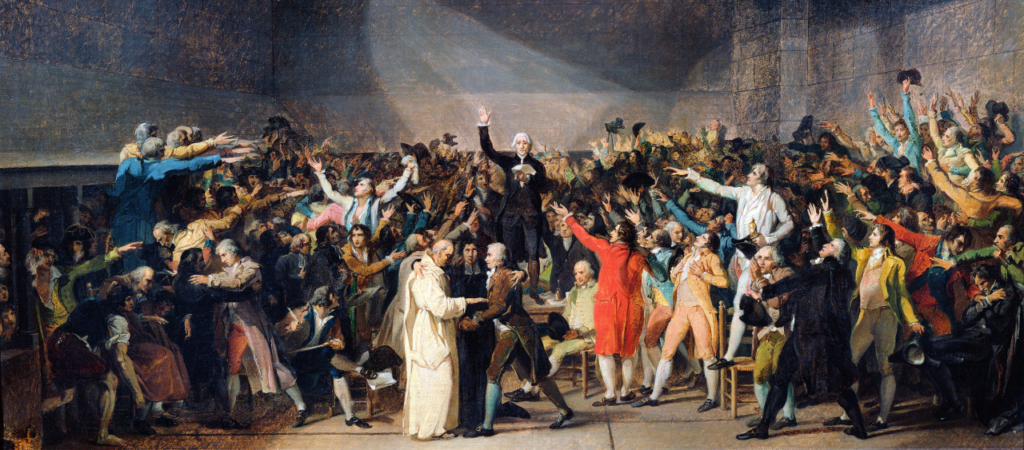Anatomy of a Revolution

French Revolution
https://frenchrevolutionbales.weebly.com/discontent-of-the-3rd-estate.html
Economic Causes
These graphs are from ‘The French Revolution and the Politics of Government Finance, 1770-1815’ by Eugene Nelson White.


- France had 60% debt to GDP before the Seven Years’ War.
- Although Britain had three times the debt, it had a parliament that could make its people pay more tax. Britain also had a national bank.
- On the other hand, France did not have a parliament or a national bank. This put pressure on Louis VXI and his advisors to call for the Estates-General, it may allow him to solve some of the huge financial problems the country was in.
- In 1789, Archbishop Brienne (the finance minister) realised that France was bankrupt. The government was forced to pay people with paper money (IOU) but this was not popular as they wanted ‘real’ money.
The long and short reasons for why Revolution broke out in France in 1789
- The article above makes an important point about why the Revolution began in 1789 and not in any other year:

- Bread was a staple diet for the majority of French people (three out of every four). The average price of bread in the 1780s was 8 sous, in 1789 it had risen to between 14 and 16 sous. An average farm worker was earn 25 sous a day and a family would need at least two loaves of bread to feed itself. You can work out why bread inflation was a major problem in France!
- So why had it risen? One key reason was the weather, the winter of 1788/79 was one of the worst in recent times, even the River Seine freezing at temperatures of -10 degrees. Another was the severe hailstorm of 1789, it destroyed large areas of farmland.
- Although the accepted date of the start of the French Revolution is 14 July 1789, it could have been 28 April, with an economic cause. Watch from 23.40 to 29.09.
a. What was the riot about?
b. Was it justified?
c. What were the consequences?
- Every event, revolution or war, has an economic cause, most have several. The inflation of the late-1780s, especially for the staple food of bread, severely hindered the lives of the poor. This led to the bread riots and the March on Versailles, a major economic and political cause of the French Revolution.

- Watch the following 13-minute video from a French movie and answer the questions below. If it does not play on Google Chrome, use a different browser (Safari usually works).
a. Who marches to Versailles and why?
b. What does the king do?
c. What were the demands of the Paris Commune?
d. What were the reactions of the crowd to seeing Louis and Marie-Antoinette?
- An interesting point about the March on Versailles is that although 5000 women began it, the National Guard of 15000 followed five hours later. This group of soldiers was meant to guard Paris but in 1789 but they decided that as the economy was so poor and they wanted change too, they marched to Versailles to get what they wanted. It is important to recognise that soldiers have families too, if the cost of living was so high, it is not a huge surprise if they are insubordinate and disobey their orders.
- The movie clip above (taken from La Révolution française) was slightly inaccurate with the crown reaction to Marie-Antoinette. She had been threatened with abusive language, violence and a horrific death from the crowd but, on seeing her, they were respectful. Why do you think the movie got this part wrong?
Storming of the Bastille
- The trigger for the Revolution was the Storming of the Bastille. The following image is from Britannica.

What does this image show you about the events of 14 July 1789?
The Storming of the Bastille Led to Democracy but Not for Long
Political and Social Causes
- The Three Estates/ Ancien Regime. Although France was making progress, scientifically and economically, it did not make sufficient change politically. There were local councils and courts, so not everything was under the control of the monarch, but the country had not moved as fast as others such as Britain and the new United States. In 1689, Britain introduced the Bill of Rights and the US had its own version.
- Although France did not refer to the Ancien Regime as the political system during the 18th century, it was still evident in the country.
The Three Estates of Pre-Revolutionary France

Tennis Court Oath
- As the Rest is History podcast points out, the Third Estate (from 48:21) were due to attend a meeting in one of the rooms at Versailles. However, Louis had decided to organise a meeting of all the three estates in the same room. When the Third Estate turned up on 20th June 1789, it was locked. So they all met in a nearby tennis court to discuss the future of France. They actually thought they had been shut out and ignored by Louis and this has become the common view ever since.
- Marie-Antoinette told her husband that it would be dangerous to meet the Third Estate. The Rest is History explains that these people were the bourgeoisie, not the peasants, so they were a dangerous political force as they wanted too much change in the country…they argue that she was proved correct!
- This was a painting by Jacques-Louis David.
- What does it show you about the meeting?
- Do you think this is what happened?

Declaration of the Rights of Man
Declaration of the Rights of Man – 1789
Three of the seventeen examples:
Men are born and remain free and equal in rights.
Human rights are liberty, property, security, and resistance to oppression.
As all persons are held innocent until they shall have been declared guilty
a. Who would argue that this document of rights was a good thing for France and why?
b. Who would disagree?
- Could Louis accept the demands (such as the Declaration of the Rights of Man) of the National Assembly? Yes and No!
- Yes, he could accept that the country should be a constitutional monarchy. There was a growing demand that the political system should change and he should accept the will of the people.
- No, France was built on a monarchical system (a king or queen should rule) and he had been brought up as a child to believe in this, as did many of the advisors, the Church and millions of others.
- But with the March on Versailles, he was forced to accept the demands of the National Assembly…although he was apparently in tears when he signed away his power.
- If this seems like the National Assembly have won a victory and are now in power, think again! The ‘mob’ who marched on Versailles initially looked for Louis and Marie-Antoinette but when they did not find them, demanded to see the members of the National Assembly. These were lawyers, doctors and the intelligentsia (the educated) from the Third Estate as well as some members who were previously from the First and Second Estates. At this stage, they were certainly not leading the mob but rather doing what it wanted.
- A key issues here is that Louis and Marie-Antoinette had rarely been outside of Versailles or even Paris. Marie-Antoinette used to like to go to Paris but the propaganda against her was so vicious that her guards said it was too dangerous for her to travel. As a result, how were they expected to know the true feelings of the people of France?
- When looking at the causes of the French Revolution, it is often looked at from the position of the monarchs. It is not seen from the perspective of the poor or the Third Estate and the huge challenges they faced.
The Church
- The content here is from The French Revolution and the Catholic Church.


- The Declaration of the Rights of Man did not mention any of the privileges which the Church had, consequently now they had none!

- Over 50% agreed to this but the announcement caused division in the country. Many saw their faith as more important than the Revolution.


